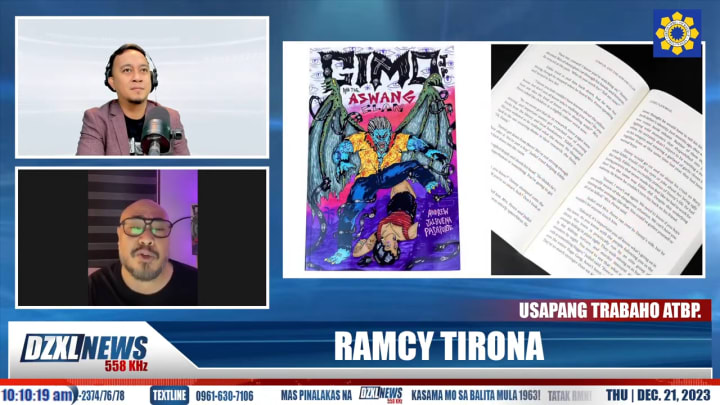Pinoy Teens Speak Up
A quiet revolution is brewing in school libraries, led by Filipino teens passionate about their folklore. The Manila Bulletin article “Zero aswang tolerance, librarian declares” caught my attention, and we’ve had some serious discussions about the stories we find in our school libraries.
Middle-grade author Andrew Jalbuena Pasaporte wrote “Gimo Jr. and the Aswang Clan” to introduce Filipino folklore, especially aswang stories, to a new generation. The book is not a horror story. It offers a fresh perspective while keeping the cultural vibes alive.
But here’s the kicker – why are stories about witches, goblins, and ghosts deemed okay for Philippine school libraries, while our creatures like tikbalangs, kapres, and aswangs get the cold shoulder? Pasaporte thinks it’s high time to embrace the rich diversity of Filipino folklore in our reading spaces, especially in schools.

Pasaporte faced a challenge when getting his book into a school library. Despite emphasizing that the book is a middle-grade novel and not meant to be scary, a librarian declined to include it in their collection. This incident sparked a broader discussion about why creatures from Western folklore get a pass while our Filipino mythical creatures face exclusion.
This got me thinking about why having more diversity in our school libraries is crucial. Teenagers want stories reflecting our heritage, experiences, and roots. It’s not about dismissing witches and ghosts but making room for our stories, creatures, and magic.
The Manila Bulletin article raises a valid point about how we perceive folklore. Filipino teens are ready to challenge the norms and demand more representation in our school libraries. We should keep pushing for more Pinoy middle-grade novels in our libraries. It’s a call for more authors to bring our stories to life, to celebrate our folklore, and to create a reading space that genuinely resonates with us.
Let’s take this enthusiasm to our school libraries! Encourage your librarians to be forward thinkers, embrace diversity in children’s literature, and make space for more Pinoy middle-grade novels. We can create a library representing our culture’s varied and vibrant stories. Let’s be the advocates for change and make our voices heard. It’s exciting to see that more people, especially teens, are curious about the tales that make our culture uniquely ours.
The Struggle Against Backward Thinking
We must confront the impact of colonial mentality on the older generation’s judgment regarding what is suitable for the younger set. Backward thinking impedes progress when people perceive conservatism as a hindrance rather than a tradition. As teens, it is our time to challenge these beliefs, maintaining a delicate balance between global standards and preserving our culture and heritage. We must navigate the fine line between honoring tradition and embracing progressive ideals.
Colonial influence has left an indelible mark on the older generation’s perspectives, often leading to conservative judgments about literature. However, as the younger generation, we stand poised to break these chains and redefine what is suitable for our age group. Our advocacy for Filipino folklore in school libraries is not just a literary preference but a call for inclusivity, representation, and a celebration of our unique cultural identity.
Our journey as advocates for Filipino folklore in school libraries is both a celebration of our cultural heritage and a bold step towards progressive thinking. Through our collective efforts, we can reshape the literary landscape of our libraries, ensuring that every teen finds stories that resonate with their experiences. Let’s embrace our role as advocates for change, steering literature towards a future where Pinoy middle-grade novels stand proudly alongside global standards.
In conclusion, the revolution has undeniably begun, and the torchbearers of change in the Filipino literary landscape are none other than the passionate and forward-thinking Filipino teens. Beyond being mere readers, we stand as advocates, relentlessly pushing for a paradigm shift that warmly embraces our cultural roots and diverse narratives. The folklore revolution is a testament to our commitment to fostering a literary space that mirrors our identity.
But our movement doesn’t stop here. We extend an open invitation to fellow teens who share our passion for diversity in literature, urging them to join us in reshaping the narrative. Let’s amplify our collective voice and champion forward-thinking librarians to be part of this transformative journey. Together, let’s fill the pages of our school libraries with stories of Filipino folklore and narratives that celebrate our heritage. The revolution is a call for inclusivity, progress, and a literary landscape that truly represents the vibrant diversity of our culture. Join us as we propel the folklore revolution forward!
